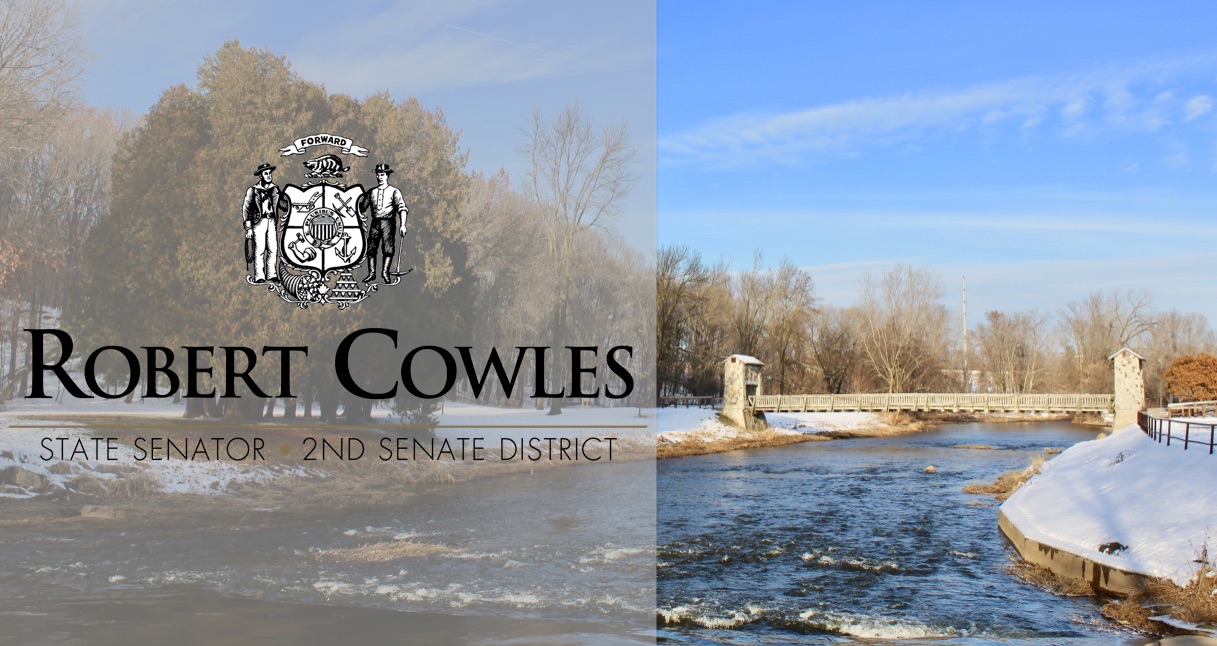|
Dear Friends and Neighbors,
It hasn’t been long since my last e-newsletter, but it’s
been a busy few days as the State Legislature has
finalized and introduced a comprehensive bill to address
the COVID-19 outbreak in Wisconsin. It took some time to
review the federal legislation and highlight all the
places the state needed to make changes to fill any
gaps, but I’m pleased that we rolled up our sleeves and
got the work done. I’ll go into details on this bill
below, along with a couple of other updates that I
wanted to share as we all navigate these difficult
times.
State Legislative Package on COVID-19
Much like the rest of the country, the COVID-19 pandemic
has impacted our state like we haven’t experienced in
our lifetimes. Not a single Wisconsinite has been
shielded from the impacts of this outbreak and the
measures to slow the spread of COVID-19.
Not long ago, the Assembly passed the Legislature’s
response to the COVID-19 outbreak on a bipartisan vote.
This comprehensive effort was the result of weeks of
bipartisan negotiations to create this package that
looks to lessen the blow on households, businesses,
schools, and local governments by taking a measured,
multifaceted approach that capitalizes on federal
funding and fills in the gaps at the state level.
The changes included in the bill will help to keep our
schools from falling behind, provide additional
assistance for those facing unemployment, remove
financial barriers to testing, keep our medical
professionals’ and first responders’ focused on their
critical work by delaying license renewal requirements,
look ahead to the reopening of our economy, and more. I
am pleased to support this important effort, will vote
in favor tomorrow when the Senate takes action on the
bill, and I will continue to look for ways that I can do
my part to help our community get through these trying
times.
2019 Assembly Bill 1038 is expected to be voted on
by the State Senate tomorrow with the session starting
at 11am. After passage in the State Senate, the bill
will head to the Governor’s desk for his consideration.
One of the biggest changes to current law
will waive the one-week
waiting period for Unemployment Insurance benefits
through February 7, 2021. I have been contacted
by many constituents supporting this change, and I was
determined to advocate for this provision to be included
in the final bill. This change is also retroactive,
meaning that, if signed into law, benefits for the first
week would be paid for the first week to everyone who is
currently waiting a week or has already waited the
one-week after already applying for unemployment
benefits.
Another change that I believe will be of key interest to
constituents requires health insurance policies, if they
would generally cover infectious disease testing, to
provide coverage for COVID-19 testing without imposing
any copay requirements through March 13, 2021. This
provision is critical to help remove a financial barrier
to testing for residents as more testing kits become
available.
Among the other provisions in this bill, I wanted to
highlight a few more provisions that I thought would be
of interest to Northeast Wisconsinites:
-
Expands the Work-Share Program which allows
employers to reduce employee’s hours during
difficult times without laying them off, and allows
the employee to have the share of hours they were
reduced to be covered by Unemployment Insurance.
-
Requires health insurers to cover out-of-network
care for COVID-19 and other services not available
at an in-network provider because of COVID-19 at the
same cost as they would charge an enrollee
in-network.
-
Expands coverage in the SeniorCare program, which
assists with prescription drug expenses for older
residents, to include vaccination coverage if a
COVID-19 vaccination is developed.
-
Prohibits insurers from discriminating against
enrollees due to a past or current diagnosis of
COVID-19, including prohibiting the cancelling of
coverage during a contract term.
-
Makes it easier to renew a prescription for 30-days
by giving pharmacists the flexibility to renew most
prescriptions without contacting a prescribing
practitioner in case that doctor isn’t available.
-
Gives the Department of Health Services the
flexibility to adapt to changes that temporarily
expands the Medical Assistance program to provide
healthcare coverage for those recently facing hard
times while increasing the federal aid that will
come to Wisconsin.
-
Provides temporary credentials at no cost to health
care providers to practice if they’ve had a license
expire in the past five years or if they’re licensed
in another state.
-
Opens the door to tens of millions of dollars in
additional federal aid for daycare providers through
the Child Care and Development Fund block grant
program.
-
Conforms Wisconsin’s tax laws with federal law
changes that, among other things, exempts
distributions from retirement accounts from
penalties and income taxes for taxable year 2020 and
creates additional charitable contribution
deductions for taxable year 2020 while suspending
deduction limitations.
-
Allows local governments to not assess interest or
late penalties on property tax installment payments
due after April 1, 2020 if the total amount is
received by October 1, 2020 and the local government
has made a finding of hardship.
-
Extends the deadlines for applications to choice
schools from April 16th to May 14th and for
applications for open enrollment from April 30th to
May 29th.
-
Removes standardized testing requirements and
waiving hours of instruction requirements on all
Wisconsin schools for the 2019-2020 school year.
-
Requires the Department of Public Instruction to
prepare guidance that will assist school districts
in returning to in-person instruction in the
2020-2021 school year.
-
Requires the Wisconsin Economic Development
Corporation to submit a report to the Legislature
and the Governor by June 30th with a plan to support
major industries impacted by COVID-19, including
tourism, manufacturing, agriculture, construction,
retails, and services for consideration in future
Legislative actions.
One final item in the bill I wanted to discuss may not
have immediate impacts like the provisions above, but is
very important long-term. As Co-Chair of the Legislative
Audit Committee, a provision I advocated for will direct
the nonpartisan Legislative Audit Bureau, beginning on
July 1, 2020 and continuing into the following year, to
review government programs impacted by COVID-19 and
expenditures made by state agencies with funds
authorized and spent by our state government. The
findings from these reviews will be published quarterly.
While Wisconsin will see billions of dollars in needed
financial resources from the CARES Act to combat
COVID-19 and assist individuals, businesses, and local
governments, disbursing these vast resources in short
order carries an immense amount of risk for
mismanagement and potential waste. It’s my belief that
the Audit Bureau analysis will help Wisconsin better
prepare for future emergency responses by improving
distribution systems and expanding recordkeeping
procedures while ensuring we account for any
mismanagement or misappropriations of funding.
If you are interested in learning more about the
legislative response to Covid-19 and you have some spare
time, you can read the full, 87-page bill on the
Legislature’s webpage. For a more condensed summary
of the bill including some context around each
provision, the nonpartisan Legislative Fiscal Bureau has
prepared a summary of the provisions in Assembly Bill
1038 which is available on
their website.
Wisconsin Emergency Assistance Volunteer
Registry
Even as residents are facing difficult circumstances and
decisions due to the pandemic, I’ve been overwhelmed by
the number of community members looking to see what they
can do to help our region get through this outbreak and
come out stronger than we’ve ever been. I’ve provided a
number of ideas for ways you can help out in previous
e-newsletters, and now I want to bring a new opportunity
for certain individuals to everyone’s attention.
As some hospitals face staffing shortages either because
of a surge in patients or because some of their staff
have had to self-quarantine due to potential exposure,
the state is seeking active or retired health care
professionals to help address these shortages. The
Wisconsin Emergency Assistance Volunteer Registry allows
medical professionals from dozens of occupations to
submit their information and be contacted with
opportunities to use their specific skills in service to
their community. Volunteers may decline opportunities if
it isn’t the right fit, and if a volunteer accepts, they
will be trained on-site.
If you’re a medical professional and want to learn more
about this selfless opportunity, thank you for your
interest and please visit the
Department of Health Services’ website to get more
information about the program and consider signing-up.
Hospitalization and Tracking Data
As of this afternoon, the state Department of Health
Services (DHS) has confirmed 3,555 positive tests of
COVID-19 in Wisconsin. An additional 37,997 tests were
conducted, but were negative for the Coronavirus. 1,049
cases of COVID-19 have led to hospitalization, which
constitutes about 30% of cases. This outbreak has also
regrettably lead to 170 deaths in our state.
In the counties that make up the 2nd Senate District,
136 cases of COVID-19 have been reported, including 97
in Brown County, 29 in Outagamie County, 6 in Shawano
County, and 4 in Waupaca County. Tracking information on
a statewide basis and county-by-county is updated by the
Department of Health Services on a daily basis at around
2pm. You can learn more and see the updated data in days
to come by visiting
DHS’s website.
Additionally, the Wisconsin Hospital Association has
established a new webpage with real time tracking of
hospitalizations related to COVID-19, including
information on intensive care cases and ventilator use.
This data can be viewed statewide or organized by region
of the state. You can find this information provided by
the Hospital Association by visiting on
their
website.
Until Next Time
My staff and I continue to remain available to assist
with questions you may have involving state government
during this difficult time. While we may not always have
the answer right away, we’ll do our best to assist with
your questions and concerns revolving around COVID-19 or
other issues related to state government.
To find the most up-to-date information on the
Governor’s actions, including the ‘Safer at Home’ order,
along with each state agency’s role in this outbreak,
I’d encourage you to visit
this
website. You can also find the information I’ve
shared in my last six e-newsletters on COVID-19 by
visiting
my website.
And as always, please feel free to
contact my office with any questions or concerns you
may have, and be sure to connect with me on
Facebook,
Twitter, and
Instagram for regular updates on Coronavirus and
more from around the
2nd Senate District and in the State Capitol.
Thanks for reading!

Senator Robert Cowles
Proudly Serving Wisconsin's
2nd Senate District
|

